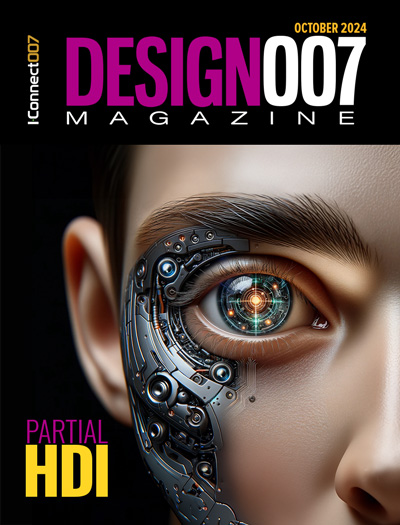-

- News
- Books
Featured Books
- design007 Magazine
Latest Issues
Current Issue
Advanced Packaging and Stackup Design
This month, our expert contributors discuss the impact of advanced packaging on stackup design—from SI and DFM challenges through the variety of material tradeoffs that designers must contend with in HDI and UHDI.

Rules of Thumb
This month, we delve into rules of thumb—which ones work, which ones should be avoided. Rules of thumb are everywhere, but there may be hundreds of rules of thumb for PCB design. How do we separate the wheat from the chaff, so to speak?

Partial HDI
Our expert contributors provide a complete, detailed view of partial HDI this month. Most experienced PCB designers can start using this approach right away, but you need to know these tips, tricks and techniques first.
- Articles
- Columns
Search Console
- Links
- Media kit
||| MENU - design007 Magazine
Manufacturing Industry's Path to Innovation and Efficiency Lies in Exponential IT, Says Info-Tech Research Group
June 18, 2024 | Info-Tech Research GroupEstimated reading time: 4 minutes
Facing heightened competition, aging legacy equipment, and significant technical debt, the manufacturing sector is under immense pressure to innovate and modernize its operations, Info-Tech Research Group explains in a new industry resource. The global research and advisory firm highlights in Priorities for Adopting an Exponential IT Mindset in the Durable Goods Manufacturing Industry that manufacturing companies must embrace exponential technologies to improve competitive positioning, with IT leaders playing a key role as valued business partners in this transformation. The new research-backed blueprint provides manufacturing and IT leaders with strategic insights and actionable plans to predict market shifts, enable proactive technology investments, and drive modernization through Exponential IT, ensuring they maintain their competitive edge and avoid disruptions.
Info-Tech Research Group’s “Priorities for Adopting an Exponential IT Mindset in the Durable Goods Manufacturing Industry” blueprint outlines actionable strategies for IT leaders in the manufacturing industry to leverage advanced technologies to improve efficiency, innovation, and customer engagement. (CNW Group/Info-Tech Research Group)
"From digitizing service models to computerizing operations and the new influx of artificial intelligence processing, information technology has drastically changed organizations," says Kevin Tucker, advisory practice lead at Info-Tech Research Group. "To make the most of this impending opportunity, IT executives will need to transform into business leaders who can unlock advanced value and insights for their company while reducing risk by implementing an IT transformation. But in the world of Exponential IT, where new skills and capacities are needed, innovation readiness is often still a mystery."
Info-Tech defines Exponential IT as the strategic integration of rapidly advancing technologies that can revolutionize the manufacturing sector. These technologies, including automation, artificial intelligence, and advanced analytics, empower manufacturing companies to enhance operational efficiency, improve resource management, and innovate production processes. Embracing an Exponential IT mindset allows manufacturers to tackle digital transformation head-on, ensuring sustainable business growth and maintaining a competitive edge.
"The manufacturing industry is urged to rapidly inject an Exponential IT implementation into its roadmap to address potential industry disruptions," explains Tucker. "It is essential for businesses to grasp the main priorities of Exponential IT transformation to stay competitive in today's challenging environment. Recognizing and integrating core foundational capabilities are considered crucial initial steps in starting a successful Exponential IT transformation, resulting in the generation of value in the industry."
The firm's research outlines critical challenges faced by the durable goods manufacturing sector in adopting Exponential IT. Key issues include the integration of cutting-edge technologies with legacy systems, the persistent difficulty in attracting and retaining skilled IT professionals, and the urgent need for effective data governance. Many manufacturers also contend with fragmented data management and the dual pressures of innovation and regulatory compliance. Overcoming these challenges demands an approach encompassing strategic planning, targeted investments in upskilling staff, and a culture that embraces technological advancement. By fortifying foundational IT capabilities and enhancing digital proficiency, manufacturers can successfully navigate digital transformation, achieving substantial gains in operational efficiency and improved customer engagement.
Info-Tech's recently published blueprint emphasizes the strategic use of advanced technologies, such as AI and data analytics, for predictive maintenance, supply chain optimization, and customer experience personalization. This approach not only safeguards sensitive data but also leverages it to fuel innovation and boost overall business performance. The firm advises that by prioritizing these technological advancements, manufacturing organizations can develop more flexible and responsive operations, ensuring sustained success in the dynamic manufacturing landscape.
In the resource, Info-Tech outlines four key priorities that manufacturing IT leaders must consider as they adopt an Exponential IT mindset:
Fund exponential value creation: As the market and IT's roles evolve, IT budgets will need to shift significantly toward innovation. This includes focusing on efficiency, sustainability, cost reduction, and faster product quality enhancement. More funding should also be directed toward advanced human-machine technologies that improve employee safety.
Team up DataOps with ModelOps: Companies are increasingly recognizing that data is their most critical asset. While data has always been important, the rise of AI and machine learning has further elevated its significance. These advanced technologies are essential for rapid decision-making, but poor-quality data can lead to poor decisions. Integrating DataOps with ModelOps ensures data integrity and effective model management.
Transform infrastructure and applications into utilities: Shifting towards a utility-based model for infrastructure and applications promotes a collaborative and innovative approach to IT asset management. Leveraging cloud solutions and low-code/no-code platforms gives organizations greater control over their outcomes and agility to respond to market changes.
Let AI take over core operations: The growing importance of data, driven by AI and machine learning, is transforming core operations. AI can enhance system efficiency, accelerate incident detection, and boost automation productivity. Ensuring high-quality data is crucial, as poor data can lead to poor decisions. Proper integration of AI in core operations allows for rapid, accurate decision-making and improved overall performance.
As the manufacturing sector navigates the complexities of the digital era, prioritizing these strategies will equip organizations to drive innovation, maintain robust data security, and deliver value-rich, personalized services that meet evolving market demands.
By adopting an Exponential IT mindset, manufacturing companies can effectively address the multifaceted challenges of digital transformation, enhance their technological frameworks, and achieve substantial improvements in operational efficiency and customer engagement. This proactive approach ensures not only operational resilience but also a competitive edge in an increasingly dynamic market.
Suggested Items
SP Manufacturing Expands with New Malaysia Plant, Acquires Ideal Jacobs
12/26/2024 | PRNewswireSP Manufacturing (SPM), a leader in Electronic Manufacturing Services (EMS), is strengthening its global presence with two major moves: opening a new manufacturing facility in Senai, Malaysia, and successfully acquiring Ideal Jacobs Corporation.
Mycronic Receives $6-8 Million SLX Mask Writer Order
12/26/2024 | MycronicMycronic AB has received an order for an SLX mask writer from an existing customer in Asia. The order value is in the range of $6 to $8 million. Delivery of the system is planned for the first quarter of 2026.
Delta Electronics, Cal-Comp Strengthen Partnership to Drive Innovation in Industrial Automation
12/25/2024 | Delta ElectronicsDelta Electronics (Thailand) Public Company Limited, a global leader in power management and IoT-based smart green solutions, and Cal-Comp Electronics (Thailand) Public Company Limited (SET Ticker: CCET), a leading industry 4.0+ electronics manufacturing services (EMS) provider, have signed a Memorandum of Understanding (MOU) to deepen their collaboration in industrial automation.
SMT Mounter Market Size Projected to Reach $5.06 Billion by 2030
12/23/2024 | openPRAccording to the new market research report "Global SMT (Surface-mount Technology) Mounter Market Report 2024-2030", published by QYResearch, the global SMT (Surface-mount Technology) Mounter market size is projected to reach USD 5.06 billion by 2030, at a CAGR of 4.7% during the forecast period.
Delta Honored as Top 10 Best Taiwan Global Brands
12/23/2024 | Delta ElectronicsDelta, a global leader in power management and a provider of IoT-based smart green solutions, was selected as one of the “2024 Best Taiwan Global Brands” for the 14th year in a row, ranking among Taiwan's top 10 global brands.


